

Digitalakademin. Engelsk grammatik & ordkunskap. I perioder brukar jag träna ord lite mer fokuserat än just med glosor till kapitlen, dels för att befästa dem men även för att använda andra lärstilar.
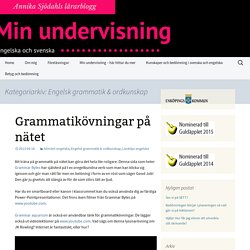
Jag kommer nedan att ge exempel på lite olika taktila sätt att träna ord, men först de mallar jag har för ordinlärning för utskrift: begreppstriangel, glosläxa och träna ord. De kan man ha som bas för ordinlärningen; eleverna kan skriva direkt i dem då nya ord dyker upp. Jag gick en gång en kurs om lärstilar (Lena Boström) och vann då en CD som gör att jag har en mall för att tillverka snottror eller snoruntare som de också kallas. Där har jag gjort snottror utifrån sjuans ordförråd i Wings basböcker. Ni som vet vilka böckerna är vet att de innehåller uppslag med bilder för att träna in semantiska ordfält. Jag har också en korg full med memoryspel med basordförrådet där man ytterligare kan få in ett arbetssätt. En populär lek att göra är odd-one-out på tavlan eller på en Smartboard om man har det, eller gissa ordet jag tänker på. About Words - Cambridge Dictionaries Online blog. By Dom Glennon Advices and informations Have you ever noticed strange codes in square brackets on entries in Cambridge Dictionaries Online and wondered what they mean?
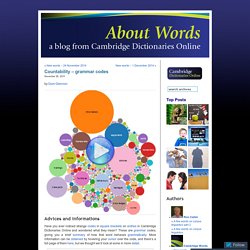
These are grammar codes, giving you a brief summary of how that word behaves grammatically. More information can be obtained by hovering your cursor over the code, and there’s a full page of them here, but we thought we’d look at some in more detail. Grammar codes on Cambridge Dictionaries Online First up, let’s look at the countability codes: these codes apply to nouns only, and tell you whether they can be singular or plural. About Words - Cambridge Dictionaries Online blog. By Kate Woodford This week we’re looking at a few more of the phrases from the plays of William Shakespeare, (1564 – 1616), that are part of ordinary ‘everyday’ English.
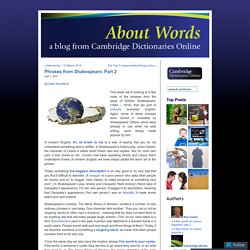
Again, some of these phrases were coined (= invented) by Shakespeare. Others, which were already in use when he was writing, were simply made popular by him. About Words - Cambridge Dictionaries Online blog. By Kate Woodford When we want to describe something, one adjective sometimes just isn’t enough!
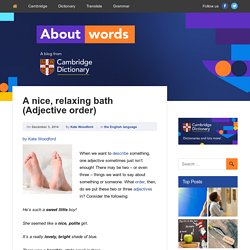
There may be two – or even three – things we want to say about something or someone. What order, then, do we put these two or three adjectives in? Consider the following: He’s such a sweet little boy! She seemed like a nice, polite girl. It’s a really lovely, bright shade of blue. About Words - Cambridge Dictionaries Online blog. Highly delighted, bitterly disappointed, ridiculously cheap: adverbs for emphasis. [by Liz Walter] We often make adjectives stronger by putting an adverb in front of them.

The most common ones are very and, for a stronger meaning, extremely: He was very pleased. The ship is extremely large. There is no such thing as a true synonym in English. Discuss! By Kate Woodford In the Cambridge Advanced Learner’s Dictionary the word ‘synonym’ is defined as ‘a word or phrase that has the same or nearly the same meaning as another word or phrase in the same language’.
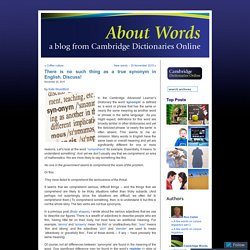
As you might expect, definitions for this word are broadly similar in other dictionaries and yet the italicized phrase ‘or nearly the same’ is often absent. This seems to me an omission. I used to work hard/I’m used to working hard (Phrases with ‘used to’) By Kate Woodford On this blog, we like to look at words and phrases in the English language that learners often have difficulty with.
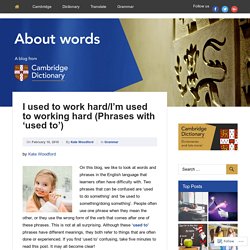
Two phrases that can be confused are ‘used to do something’ and ‘be used to something/doing something’. People often use one phrase when they mean the other, or they use the wrong form of the verb that comes after one of these phrases. This is not at all surprising. Although these ‘used to’ phrases have different meanings, they both refer to things that are often done or experienced. I used to walk to the office in my old job. I used to have fair hair when I was a child. The first sentence describes something that happened repeatedly in the past (I walked every day). 1 things that regularly happened in the past 2 continuous states in the past. About Words - Cambridge Dictionaries Online blog.
By Colin McIntosh New words are entering the language all the time.
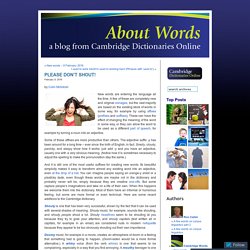
A few of these are completely new and original coinages, but the vast majority are based on the existing stock of words in some way, for example by using affixes (prefixes and suffixes). These can have the effect of changing the meaning of the word in some way, or they can allow the word to be used as a different part of speech, for example by turning a noun into an adjective. Some of these affixes are more productive than others. The adjective suffix -y has been around for a long time – ever since the birth of English, in fact. And it is still one of the most useful suffixes for creating new words. Shouty is one that has been very successful, shown by the fact that it can be used with several shades of meaning. Doomy music, for example in a movie, creates an atmosphere of doom or a feeling that something bad is going to happen. Mumpreneurs and staycations – the rise of the modern suffix. The Cambridge Advanced Learner’s Dictionary defines a suffix as ‘a group of letters added at the end of a word to make a new word’.
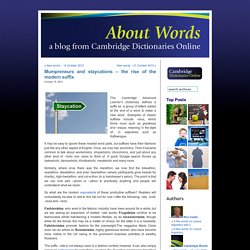
Examples of classic suffixes include -ness, which forms noun such as greatness and –esque, meaning ‘in the style of’, in adjectives such as Kafkaesque. It may be easy to ignore these modest word parts, but suffixes have their fashions just like any other aspect of English. Once, we only had alcoholics. Then it became common to talk about workaholics, shopaholics, chocoholics, and just about any other kind of –holic one cares to think of. A quick Google search throws up bakeaholic, danceaholic, Kindleaholic, meataholic and many more. Similarly, where once there was the marathon, we now find the bikeathon, readathon, tweetathon, and even beardathon (where participants grow beards for charity), high-heelathon, and cut-a-thon (in a hairdresser’s salon).